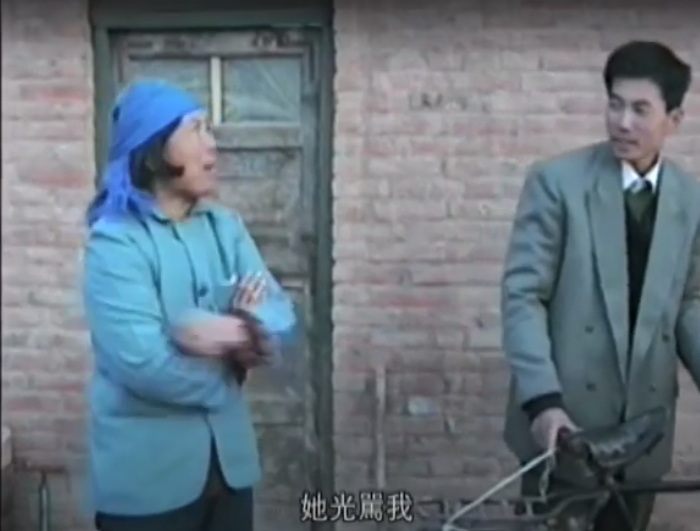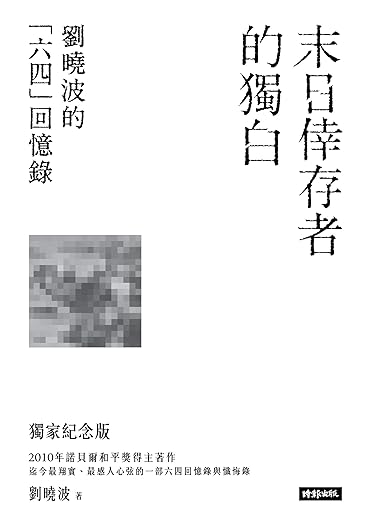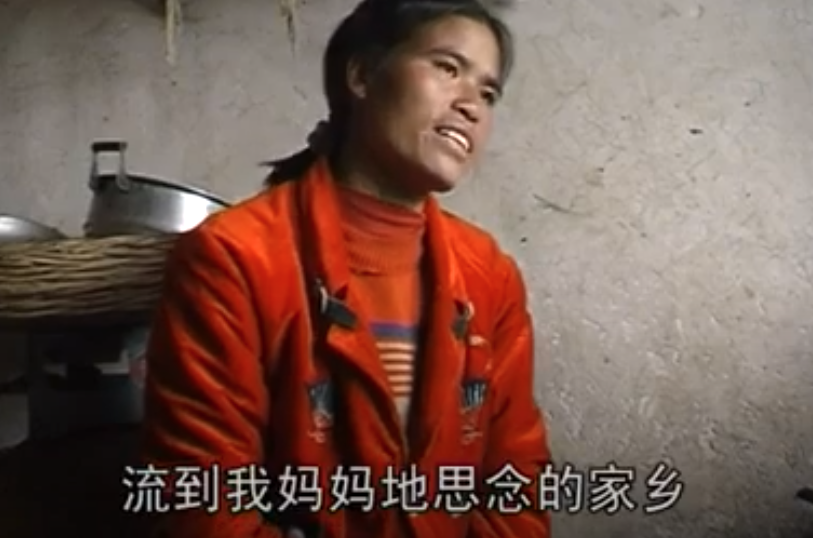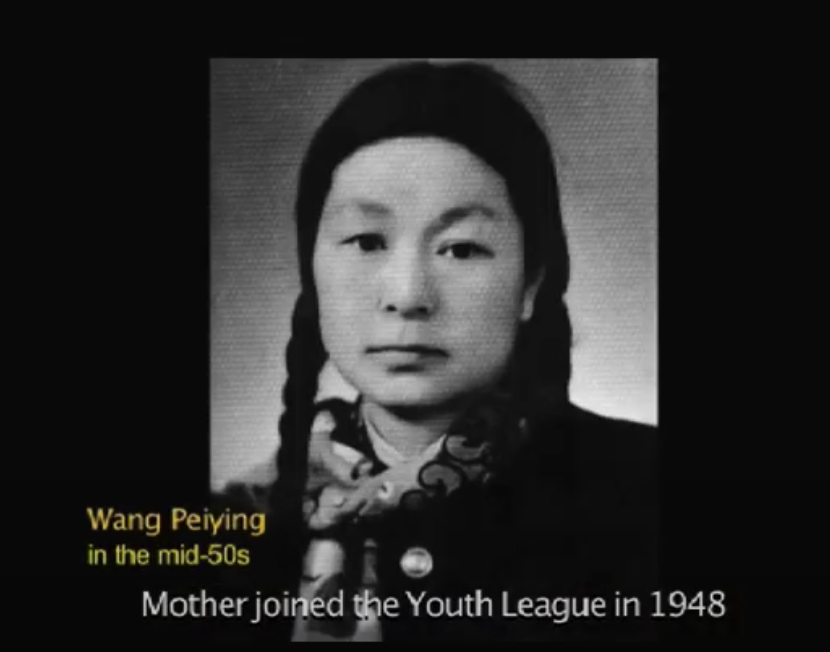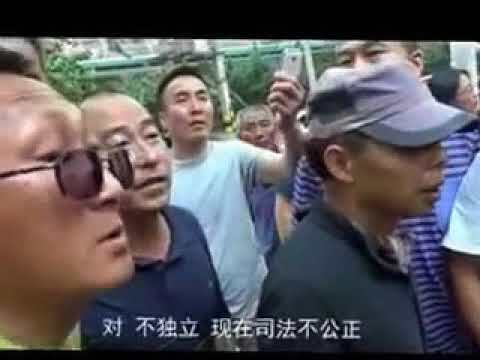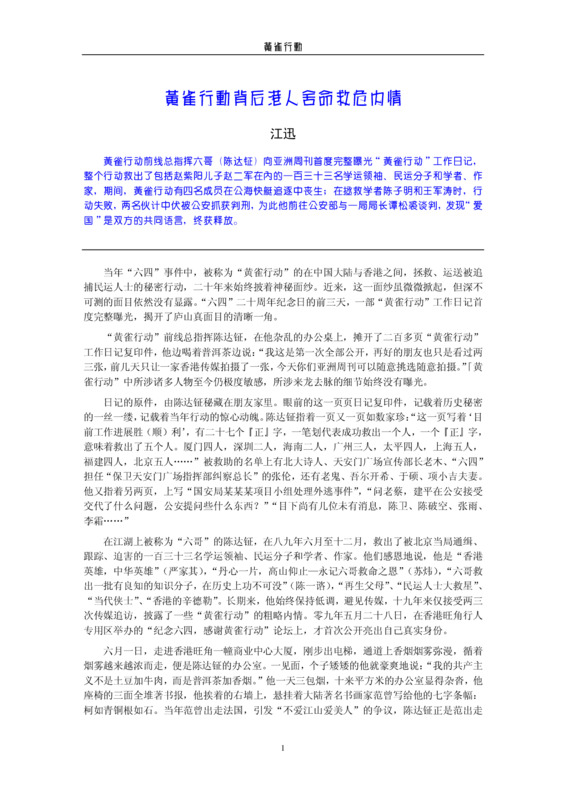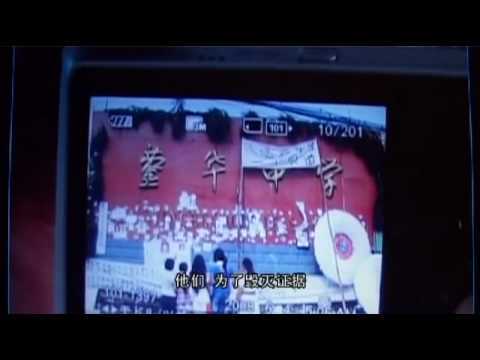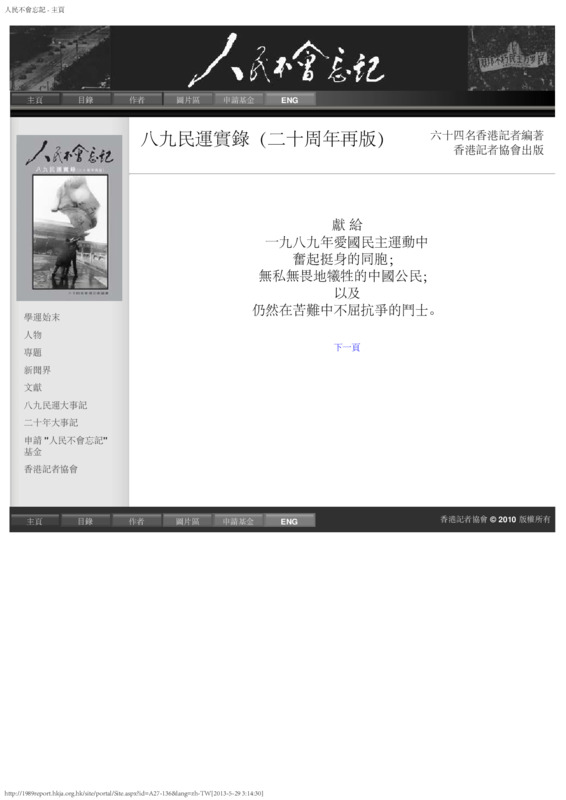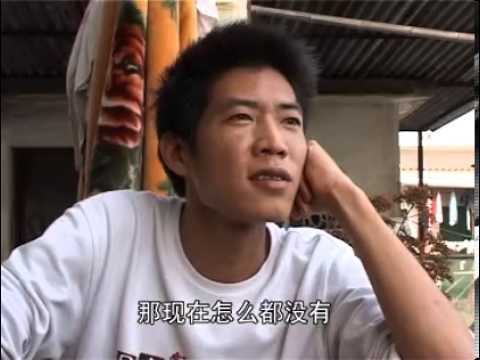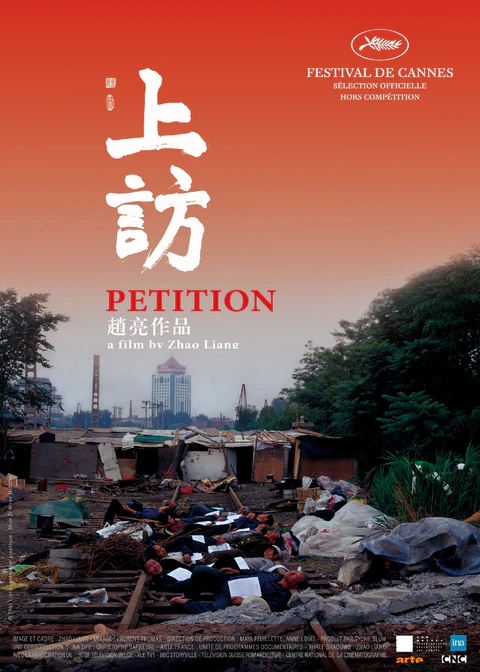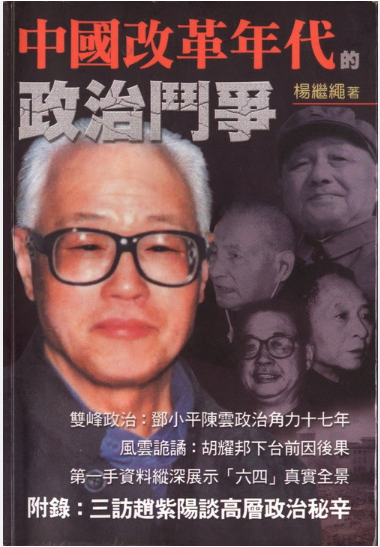Explore the collection
Showing 153 items in the collection
153 items
Book
Major Events, Tiananmen 1989
The author was a key member of the 1989 pro-democracy movement when he was teaching at the Chinese University of Political Science and Law. After the June 4 massacre, he went into exile. Currently, he has settled in Taiwan, where he teaches a course on the truth of the June Fourth Incident at Soochow University and National Chung Cheng University. Wu Renhua has published several books related to the June Fourth Incident. With a master's degree in Classical Literature from Peking University, he has written a book on June 4 that emphasizes the reliability of the sources of information. This book records the major events that happened every day during the June 4 period (April 15th to June 9th).
Film and Video
Matchmaker, The
The tradition of matchmaking is still prevalent in northern rural areas today. This film records the story of Yang Xiuting, a matchmaker living in Guan County, Shandong Province. It describes how, due to economic reforms, rural people went to cities to find work. Subsequently, young people began to choose their own spouses. Thus, the ancient profession of matchmaker not only faces challenges, but also encounters new problems.
Film and Video
Memory of Lin Zhao
Independent director Tiger Temple began shooting this film in 2010 and completed it in 2012, with subsequent revisions. The film features interviews with Lin Zhao's former lover Gan Cui as well as interviews with several independent scholars such as Qian Liqun and Cui Weiping. It is a powerful addition to Lin Zhao's memory. This film was selected as one of the top 20 finalists in the 2012 Sunshine Chinese Documentary Awards.
Book
Monologue of a Doomsday Survivor: About Me and June 4
购书链接:https://www.kobo.com/hk/zh/ebook/ZoerWPfG8TiqoXIYwvW2iw。
Film and Video
Mountain Songs from the Plains
Luo Xiaojia, a young Yunnan Yi girl was trafficked to the plains of Shandong at the age of 17 and forced to marry a young farmer in the area. The film documents her family life in the unfamiliar Shandong countryside and her longing for home. In her tenth year in Shandong, she finally fights for the opportunity to return home. After a 4,000-kilometer journey, she returns to her hometown of Yunnan and sees her mother, whom she misses day and night. However, she struggles with conflicting emotions, and returns to Shandong with a mountain song that her mother sings for her. This movie reflects the sad fate of trafficked women in China and the social psychology that follows these tragedies.
Article
My Life: China's Direction
When the Cultural Revolution broke out, Yang Xiaokai was a senior high school student at No. 1 Middle School in Changsha. On January 12, 1968, he published an article entitled "Where is China Going?" which systematically put forward the ideas of the "ultra-leftist" Red Guards, criticized the privileged bureaucratic class in China, and advocated for the establishment of a Chinese People's Commune based on the principles of the Paris Commune. Yang Xiaokai recalled that his parents were beaten because they sympathized with Liu Shaoqi's and Peng Dehuai's views, and that he was discriminated against at school and could not join the Red Guards. As a result, he joined the rebel faction to oppose the theory of descent. Yang Xiaokai was later sentenced to 10 years' imprisonment for this article. Yang Xiaokai died in 2004. This article is a retrospective of his life.
Book
My Mother :Gao Yaojie
Author Eva writes about her relationship with Gao Yaojie, a Chinese doctor. Dr. Gao Yaojie, who was severely repressed by the Chinese government for exposing the mass infection of Chinese farmers in Henan Province, China, by selling their blood, had no choice but to leave China at the age of 78 and go into exile in the United States. The dissemination of her story is strictly forbidden in China. In this book, author Eva describes Gao Yaojie's noble heart, her story, and her experiences.
Film and Video
My Mother Wang Peiying
On January 27, 1970, Wang Peiying, a cleaner at a kindergarten in Beijing, was sentenced for counter-revolutionary crimes at a 100,000-person public trial held at the Workers' Stadium in Beijing. She was then taken to the execution ground along with a dozen other political prisoners to be executed by firing squad. Wang Peiying was strangled to death in the torture wagon because she preferred to die rather than give in and shout slogans. Forty years later, her daughter, Kexin, began to search for her mother's story. Through her mother's coworkers, friends in distress, and the task force, she gradually discovers her mother's experience as an active counterrevolutionary. In order to protect her conscience, Wang Peiying chose to stand up for her dignity and freedom to tell the truth, and willingly endured brutal torture. The documentary reflects the brutality of the Cultural Revolution and the destruction of humanity.
Book
My Western Region, Your Eastern Land
The first edition of this book was published two years before the landmark event on July 5 in Urumqi from which the ethnic problems in Xinjiang erupted. The "July 5 Incident" was an ethnic vendetta in Urumqi that resulted in thousands of deaths and injuries. It has been regarded as a turning point in the all-out hostility between Uyghurs and Han Chinese and in the shift of Xinjiang's governance from economic development to political high-handedness. The book is thus considered prescient and ahead of its time. Before writing the book, Wang Lixiong had been imprisoned for more than 40 days on the charge of "stealing secret state documents." But this imprisonment brought him a great reward: he was to meet Muhtar, an ethnic Uyghur who was also a political prisoner. "It was because of Muhtar that the book took on a new perspective," says Wang Lixiong. Xinjiang is no longer a symbol in documents, books and materials, but has real flesh and blood, emotions, and even body heat.
Article
New Evidence Concerning the Authenticity of The Tiananmen Papers
Few books on recent Chinese history have caused such controversy as "The Tiananmen Papers". The book is ostensibly a collection of original documents compiled by Zhang Liang, a pseudonym for someone claiming to be a high-ranking CCP official who leaked the papers. The book’s credibility was aided by it being edited by two well-known western scholars of China, Perry Link, then of Princeton University and now of the University of California, Riverside, as well as Columbia University professor Andrew J. Nathan. An introduction was written by Orville Schell, a well-known writer on China who was then a professor at the University of California, Berkeley.
Almost immediately upon publication, the book was criticized for its unclear provenance, a point aided by Zhang Liang’s anonymity. Most scholars agreed that the papers were a mixture of previously released documents from government offices, which were uncontroversial, and accounts of meetings between senior leaders. The latter came under scrutiny, with some saying that the language appeared stilted or seemed to mix in language used in leaders’ public speeches.
This essay by the well-known Hong Kong publisher Bao Pu points out that since 2004, most people seem to feel that the issue of provenance will never be settled but that the documents are still important historically. Bao critiques this, using books published over the past two decades to update the question of authenticity. In careful language, he further questions key points of the documents, showing that they do not match new material, such as memoirs. Bao's conclusion: the Tiananmen Papers are not documents from the CCP’s archive, which is their claim, but rather works of dubious origin that cannot be used to better understand the events leading up to the massacre of civilians on the night of June 3-4, 1989. The top-secret documents, Bao writes, are a “phantom” that must not be used as building blocks for history.
Film and Video
Onlookers
People from all over China rush to the scene of China's trial of Bo Xilai, the former Chongqing Party Secretary of the Communist Party of China. The trial took place in August 2013 at the Jinan Intermediate People's Court in Shandong Province. Reporter Liu Xiangnan captured the scene.
Article
Operation Yellow Bird
After the bloody suppression of the June 4 Democracy Movement, the Chinese Communist Party went on a massive manhunt for the key figures of the movement. Some Hong Kong people organized a secret channel to help pro-democracy activists escape from the Mainland, codenamed "Operation Yellow Bird." The author of this book, Jiang Xun, is a veteran of the media and describes in detail how the "Yellow Bird Operation" took place.
Article
Oral Interviews with Global Feminists
As one of China's foremost feminist activists and thinkers, Ai was interviewed by the Global Feminisms Project at the University of Michigan. In this interview, Ai talks about her upbringing as well as about the current state of feminism in China and its outlook.
Film and Video
Our Children
This documentary records the stories of the 2008 Sichuan earthquake. The narrators mainly consist of the parents of students who fell victim to the earthquake, and the film is interspersed with comments from media workers, independent scholars, internet authors, geologists, and environmental protection and legal workers. They expressed their views on the Sichuan earthquake from different perspectives.
This film is in Chinese with Chinese subtitles.
Book
Pastor Wang Yi's Anthology: Carrying the Cross - A History of Chinese Family Churches
Wang Yi, of Chengdu, Sichuan Province, is a well-known Chinese intellectual who later became a pastor. The Early Rain Reformed Church that he led was one of the most famous unregistered churches in China. The church occupied the floor of an office building in Chengdu and had its own bookstore, seminary, and pre-school. It regularly had services of hundreds of people. Later, the church had internal conflicts, while at the same time Wang became more outspoken in his criticism of the government. In 2018, he criticized Xi Jinping for abolishing term limits and allowing himself to become ruler of China for life. Pastor Wang was sentenced to nine years in prison in 2019.
This book is based on the recordings of Pastor Wang's classes at Early Rain in 2018. The first five chapters were reviewed by Pastor Wang himself, but he was arrested before he could complete the review of the last five chapters. The essays cover key issues that concerned Wang, including the role of the church in China as a city on the hill, the role of the Reform church in China, and the history of unregistered churches in China.
Book
People Will Not Forget:A Chronicle by 64 Hong Kong Reporters
This book published by the Hong Kong Journalists Association, summarizes the June 4 reports of dozens of journalists. The first edition was released in July 1989, and was reprinted on the 20th anniversary of June Fourth.
Film and Video
People’s Representative Yao Lifa
Yao Lifa, a teacher from Hubei, was an independent candidate for the 2003 General Election of Deputies to the National People’s Congress. This documentary records the process in which Yao publicized and educated the public on election laws, and his experience with the grassroot electoral campaign. This documentary also reflects the budding grassroot awareness of civil rights in China through voices from the media and ordinary people.
This film is in Chinese with Chinese subtitles.
Film and Video
Petition
The domestically-released version of "Petition" consists of three parts: “The Masses,” “Mother and Daughter” and “Beijing South Railway Station.” Part one, “The Masses,” brings together the stories of petitioners of various backgrounds, who all for different reasons, ended up walking the same path. “The Masses” gives a comprehensive account of what is petitioning and and follows the process.
Part two, "Mother and Daughter," follows the story of Huaying, who brought her daughter Xiaojuan alongside her from the countryside of Jiangsu to Beijing to petition when Xiaojuan was only four years old. Over the next twelve years, they lived a wandering life. "Mother and Daughter" spans the longest period among all the parts of Petition, from 1996 to 2008. It witnesses the growth of Xiaojuan over ten years of petitioning, not only describing the sorrow of Chinese petitioners, but also revealing how long-lasting petitions cases affect the fate of the next generation. In official reports, petitioners lack a voice and appear to be even more marginalized under the media’s tactics. It also raises the issue of forced psychiatric confinement of individuals the Chinese government deems difficult.
“Beijing South Railway Station" surveys the "petitioner village," a residential area near the station that was once home to tens of thousands of people from all over the country. It was eventually demolished by authorities in preparation for the 2008 Olympics. The film captures bungalows being knocked down, shacks being flattened, and security police chasing after residents, the latter not given the time to grab any necessities.
Zhao Liang recalls dressing like the interceptors when filming interceptors, and dressing like a petitioner while filming petitioners. “I had several outfits, and tried to stay low key, using the smallest cameras possible.” The film went on to win the Halekulani Golden Orchid Award for Best Documentary Film at the 29th Hawaii International Film Festival, and a Humanitarian Award for Documentaries at the 34th Hong Kong Film Awards.
Book
Political Struggles in China's Reform Era
The author of this book, Yang Jisheng, is a veteran journalist with 35 years of experience in journalism at Xinhua News Agency, China's official news organization. He knows a great deal about the ups and downs of Chinese politics after the end of the Cultural Revolution as well as the intricate power struggles at the top and has a lot of first-hand information. He personally interviewed Zhao Ziyang, Zhu Houze, Li Rui, Ren Zhongyi, An Zhiwen, Tian Jiyun, and other important people. “Political Struggles in China's Reform Era”, first published in Hong Kong in November 2004, was the subject of a series of crackdowns by the authorities against Yang Jisheng. It was republished in 2010 by Hong Kong's Cosmo Books.
Film and Video
Postcard
After retiring from her job as a cadre, Wang Lihong fulfilled what she saw as her civic responsibility to become more active in women’s rights in China, especially the protection of their legal rights. In 2009-2010, she became involved in the “Fujian Netizen Case,” which resulted in the arrest of three human rights activists, who all sought to investigate the death of a 25-year-old women believed to have been murdered in a gang rape by men associated with the local police. Wang Lihong wrote letters to the General Secretary of the Fujian Provincial Committee of the Communist Party of China every day for nine consecutive days, calling on the authorities to let them go home for the New Year. For this reason, she was criminally detained by the authorities in March 2011 on suspicion of "picking quarrels and provoking trouble." The case was heard by the Beijing, Chaoyang District People's Court on August 12; nearly a month later, on September 9, the court issued a guilty verdict and sentenced Wang Lihong to nine months in prison. The film documents her case, and raises questions about the accountability of the local government and police. Another one of Ai Xiaoming’s films, “Let the Sunshine Reach the Earth,” documents Wang Lihong’s trial process in more detail.
This film is in Chinese with Chinese subtitles.

